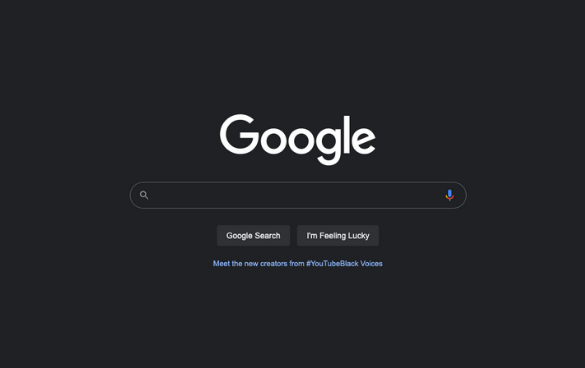-
 Published: Dec 30, 2021
Published: Dec 30, 2021
-
 8 min. read
8 min. read
-
 Macy Storm
Macy Storm Senior Content Creator
Senior Content Creator
- Macy is a marketing writer with over five years of experience creating content for dozens of industries including food and beverage, home services, and education. She also specializes in creating SEO and PPC content. Her work has been featured by Search Engine Journal, HubSpot, Entrepreneur, Clutch, and more. In her free time, Macy enjoys trying new crafts and reading comic books.
Did you know Google fields over 5.8 billion search queries every day? With so many users conducting searches, it’s an excellent opportunity for you to reach people interested in your business.
So, what is a search query, and how can you optimize for it to drive relevant traffic for your business?
On this page, we’ll answer questions like:
- What is a search query?
- What types of search queries are there?
- How can I optimize my website to appear in more search results?
Want to get tips and tricks for marketing your business in search results and more? Subscribe to Revenue Weekly for free insider information on how to market your business!
What is a search query?
A search query is the words and phrases people input into a search bar. These words and phrases generate a list of relevant results. While many people tend to confuse the two, search queries and keywords differ from each other.
Keywords make up search queries. A search query uses keywords to find relevant information. Search queries are crucial to your business because they help users find your business.
If you want to take full advantage of Google search queries, you must understand the idea of combining keywords and phrases to comprehend how users conduct searches.
3 types of Google searches
When you’re learning about search queries, you’ll discover that there are different types of Google searches. Let’s take a look at three types of Google searches you’ll commonly encounter:
1. Navigational search queries
Navigational search queries focus on finding specific websites or webpages. These are extremely branded searches.
For instance, if someone types “YouTube” in the search bar rather than typing in the URL, this is a navigational search query. The user knows what website they want, and the search intent is evident.
Can you target this type of Google search query?
Not really. Since these search queries focus on a specific brand, the user already knows what website they want. If you aren’t that website, you’re not going to fulfill their needs.
The only way you can optimize for navigation search queries is by ensuring that your website appears at the top of the search results for your brand. Theoretically, your business should be the first listing for your branded search query, so verify that your listing is first.
2. Informational search queries
Informational search queries are queries that cover a broad topic. When users conduct informational searches, they’re not looking for a specific site or looking to buy a particular product.
The search query intent for this type of search is to find answers to a question or learn how to do something.
The premise of informational search queries is users search to find more information and gain knowledge.
You’ll notice that the search results for informational search queries typically feature a position zero answer box, as well as a “people also ask” section, in addition to instructional YouTube videos.
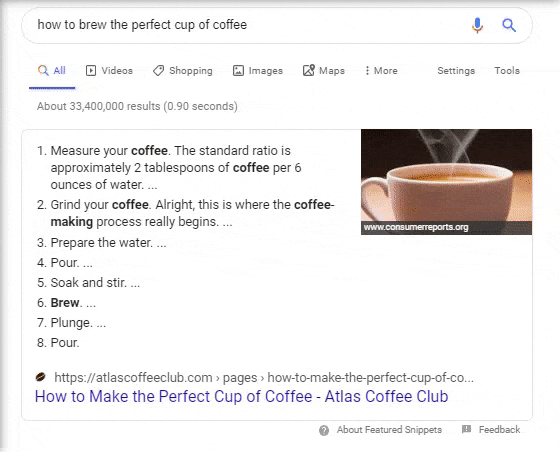
Can I target informational queries?
Yes! Companies target these types of queries most often because you can easily rank for them.
You can rank for these queries by creating high-quality content optimized search engine optimization (SEO).
When you create high-quality, relevant content, you help your site rank better in informational search queries. You position yourself as a trustworthy and authoritative source of information.
3. Transactional search queries
The last type of search query on Google is a transactional search. With transactional searches, users look to make a purchase.
Transactional search queries come in a few forms:
- Brand name and product (“Mr. Coffee coffee maker”)
- Generic product query (“coffee maker”)
- Transactional phrases (“buy coffee maker” or “purchase coffee maker”)
These are common transactional queries users conduct to find products.
Notice that the search results for transactional queries usually result in ads — since these searchers are ready to make a purchase.
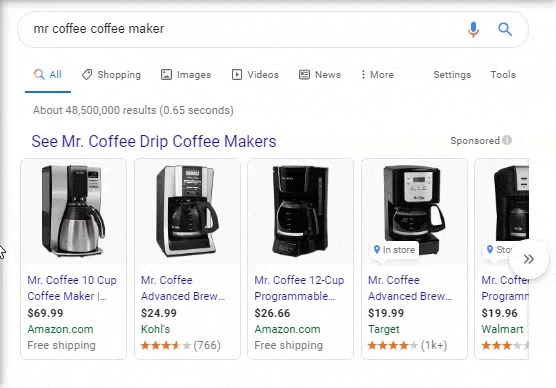
There is also a subcategory of transactional searches known as vertical searches. These searches are queries to find local businesses, like restaurants and stores.
Can I target transactional search queries?
Yes! For these search queries, you can optimize your product pages to help them appear in more relevant queries. You can optimize your pages by integrating relevant keywords and improving the shopping experience on your site to encourage more people to buy your products.
You can also improve opportunities for transactional queries by investing in local SEO. Local SEO will help you adapt to the vertical searches that people conduct on search engines.
How do I rank in the right search queries?
Now that you know more about the different kinds of search queries let’s look at how you can get your business to rank in relevant search results.
1. Choose relevant keywords
Keywords play a crucial role in search queries on Google. Search engine users use keywords to conduct their queries and find relevant results. If you want to rank in beneficial search results for your business, you must choose relevant keywords.
So, how do you find relevant keywords for your business?
First, start by conducting keyword research. Keyword research will help you find relevant terms and phrases related to your pages, website, and industry. You’ll want to stick to keywords associated with your business and industry to ensure you’re driving relevant traffic for your business.
As you conduct keyword research, focus on long-tail keywords. Long-tail keywords contain three or more words. These keywords benefit your business highly because they drive more relevant traffic to your website.
An example of a long-tail keyword is “how to take out a personal loan.” The search query intent is evident with this keyword. You know that someone who searches this keyword wants information on how to take out a personal loan.
On the other hand, someone who searches “personal loan” doesn’t have as clear of search intent.
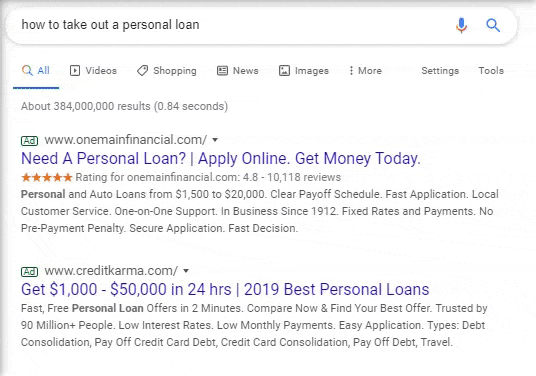
When searchers use this short-tail keyword, it’s difficult to tell if they want to know what it is, how to take one out, or where to get one. Short-tail keywords can end up driving traffic to your site that bounces when they find your information isn’t helpful to their vague query.
By choosing the right keywords, you’ll help your business appear in relevant search queries and drive more traffic to your page.
2. Create quality content to appear in more search queries
If you want to appear to interested leads, content creation will help them find you. Without content, it’s impossible to rank in search engine results pages — making content creation one of the most important parts of any marketing strategy.
Content will help you drive interested traffic to your page. You’ll provide your audience with information they want while establishing yourself as a trustworthy and authoritative source.
To start creating content, select topics based on keyword research. Can’t seem to think of any topics for your keyword? Try using our free Blog Topic Idea Generator to help you come up with new topics!
Once you know your keyword and establish the search query intent, you’ll choose your content format. Content comes in numerous forms, including:
You’ll want to use a variety of these formats to keep your content exciting and engaging for your audience.
Once you select your format, start creating! It’s a good idea to have an outline for your content, so you know what you want to cover. Looking at the search query intent will help you outline and shape your article.
When you create content, consider creating a content calendar to ensure that you’re consistent with posting. A consistent content marketing plan will help you appear in more search results and drive more traffic for your business.
3. Optimize your website
If you want your website to appear in a search query on Google, it must be optimized. Users don’t want to visit your site and find an abundance of user experience issues. It will deter them from your page and make it more difficult for you to rank high in search queries.
Did you know that WebFX offers website user experience analysis services to ensure that your site is attractive to visitors?
You optimize your site by:
- Improving page load time
- Ensuring your website is mobile-friendly
- Making sure that links are valid and not broken
- Optimizing title tags and meta descriptions
- And more
Optimizing your website will help keep leads on your site, which improves your ranking in search queries. You’ll drive more traffic to your site if you maintain your pages and ensure they operate smoothly for your audience.
Start optimizing your site to appear in relevant search queries today
If you want to grow your business online, you need to appear in related search queries. Optimizing to appear in Google search queries will help you drive more traffic and leads for your business.
At WebFX, we have over a decade of experience in optimizing for search queries. With our team of over 500 SEO experts, we’ll help you optimize your pages to appear in more relevant search queries. We help you drive better traffic to your site that turns into more conversions for your business.
To learn more about our SEO services, contact us online or call us today at 888-601-5359 to speak with a strategist.
-
 Macy is a marketing writer with over five years of experience creating content for dozens of industries including food and beverage, home services, and education. She also specializes in creating SEO and PPC content. Her work has been featured by Search Engine Journal, HubSpot, Entrepreneur, Clutch, and more. In her free time, Macy enjoys trying new crafts and reading comic books.
Macy is a marketing writer with over five years of experience creating content for dozens of industries including food and beverage, home services, and education. She also specializes in creating SEO and PPC content. Her work has been featured by Search Engine Journal, HubSpot, Entrepreneur, Clutch, and more. In her free time, Macy enjoys trying new crafts and reading comic books. -

WebFX is a full-service marketing agency with 1,100+ client reviews and a 4.9-star rating on Clutch! Find out how our expert team and revenue-accelerating tech can drive results for you! Learn more
Try our free SEO Checker
Boost your site’s search performance with our free SEO Checker. Analyze your website for optimization tips on titles, headers, content, speed, and more. Get a free report now to enhance rankings on Google, Bing, Yahoo, and beyond!
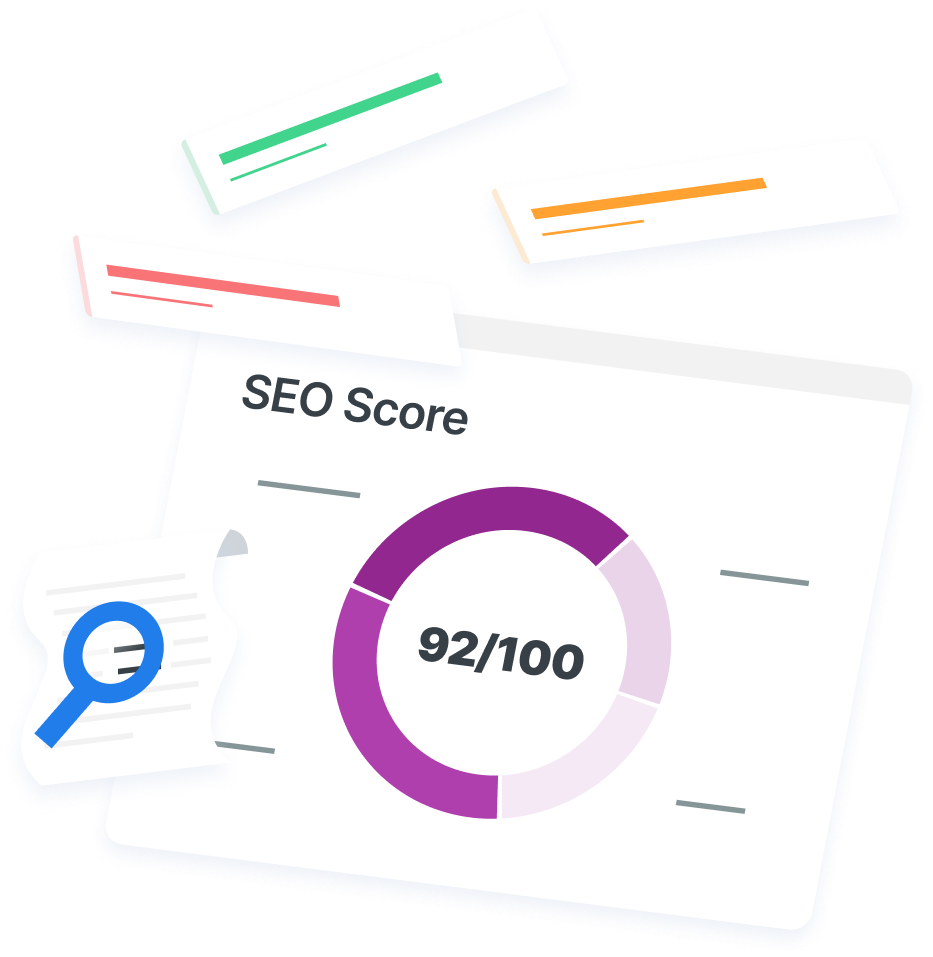

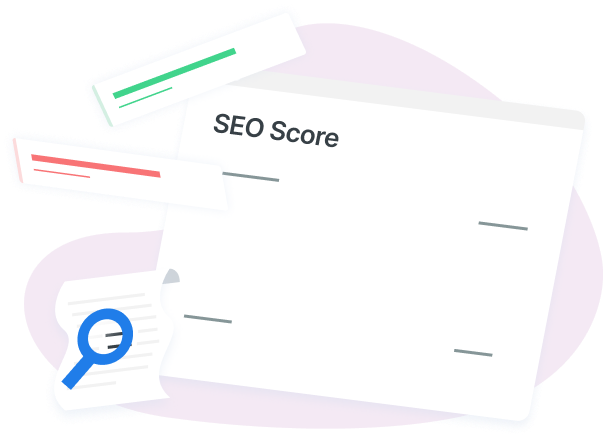
How Is Your Website’s SEO?
Use our free tool to get your score calculated in under 60 seconds.
Try our free SEO Checker
Boost your site’s search performance with our free SEO Checker. Analyze your website for optimization tips on titles, headers, content, speed, and more. Get a free report now to enhance rankings on Google, Bing, Yahoo, and beyond!


